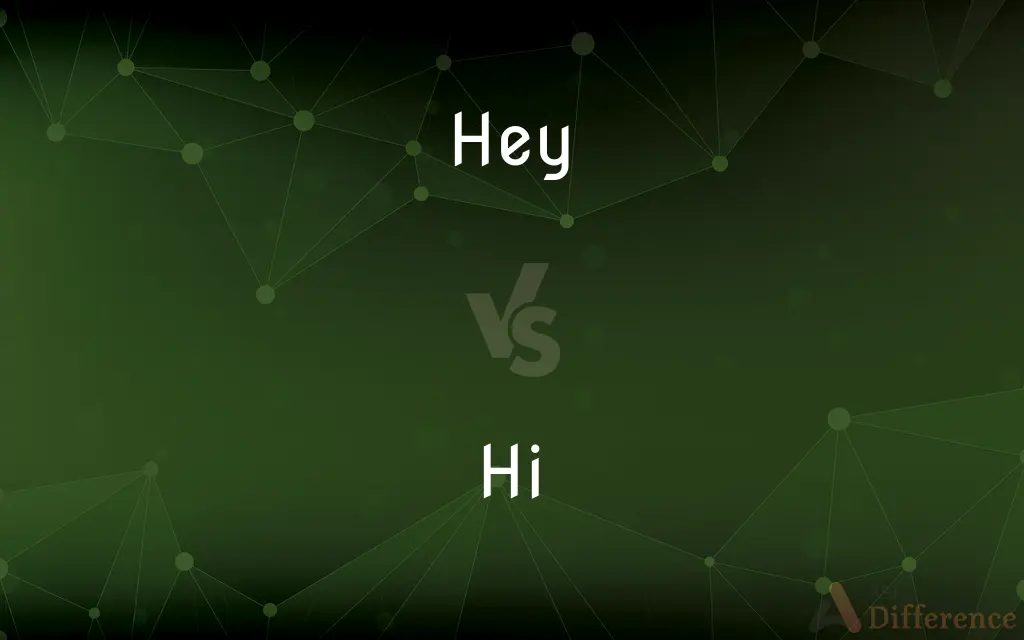Hey vs. Hi — What's the Difference?
Edited by Tayyaba Rehman — By Fiza Rafique — Updated on September 21, 2023
Hey is a casual greeting often used among friends or in informal settings. Hi is another form of greeting but is more neutral and can be used in both casual and semi-formal situations.

Difference Between Hey and Hi
Table of Contents
ADVERTISEMENT
Key Differences
The word Hey is a greeting that is generally considered informal. It is often used among friends, close acquaintances, or in settings where an informal tone is acceptable. In American culture, "hey" is very common and is frequently used to initiate conversations.
In contrast, Hi is a bit more neutral and versatile. While it can be used informally like "hey," it is also appropriate for semi-formal occasions or when greeting someone for the first time. "Hi" is often considered safer when the level of formality isn't clear.
Hey can also be used to draw someone's attention, especially if you add emphasis or elongate the word. For example, yelling "Hey!" across a room would likely draw attention from multiple people. In such a case, "hey" functions more as an interjection than a greeting.
Hi, however, is less likely to be used to draw attention in the same way. It tends to stick closely to its role as a greeting and is less versatile in its usage compared to "hey." When you say "hi," it is almost universally understood as a simple greeting.
Both Hey and Hi serve the primary function of initiating interaction or acknowledgment. However, "hey" is more likely to be used in American English and is considered more casual. "Hi" offers a middle-ground level of formality and is widely accepted in different social settings around the world.
ADVERTISEMENT
Comparison Chart
Formality
Informal
Neutral (Casual or Semi-formal)
Versatility
More versatile
Less versatile
Common Usage
Among friends, casual settings
Broadly accepted
Functions
Greeting, drawing attention
Primarily a greeting
Cultural Acceptance
More common in American English
Globally accepted
Compare with Definitions
Hey
Used to draw attention.
Hey, look at this!
Hi
Globally understood and accepted.
Hi, welcome to our country.
Hey
Often used to initiate conversations.
Hey, got a minute?
Hi
A neutral greeting suitable for many settings.
Hi, nice to meet you.
Hey
An informal greeting among friends.
Hey, how've you been?
Hi
Often used in first encounters.
Hi, I'm Sarah.
Hey
Common in casual settings.
Hey, can I join you?
Hi
Can be used in both casual and semi-formal situations.
Hi, may I speak to the manager?
Hey
Used to attract attention, to express surprise, interest, or annoyance, or to elicit agreement
Hey, what's going on here?
Hi
Lacks the versatility of "hey."
Hi, how are you?
Hey
Used to attract attention or to express surprise, appreciation, wonder, or pleasure
"Oh, hey, you saw that ninety-nine-yard punt return in the Super Bowl? Wow, so did I!" (Don Pfarrer).
Hi
Used to express greeting. See Note at hey.
Hey
Used to express greeting.
Hi
A friendly, informal, casual greeting said upon someone's arrival.
Hi, how are you?
I just dropped by to say “hi”.
Hey
An exclamation to get attention.
Hey, look at this!
Hey! Listen!
Hi
An exclamation to call attention.
Hey
A protest or reprimand.
Hey! Stop that!
Hi
(dated) Expressing wonder or derision.
Hey
An expression of surprise.
Hey! This is new!
Hi
The word "hi" used as a greeting.
I didn't even get a hi.
Hey
An informal greeting, similar to hi.
Hey! How's it going?
Hi
Informal spelling of high, often in hyphenated terms.
Get hi-quality videos here!
Hey
A request for repetition or explanation; an expression of confusion.
Hey? How's that?
Hi
An expression of greeting;
Every morning they exchanged polite hellos
Hey
A meaningless beat marker or extra, filler syllable in song lyrics.
The chorus is "nana na na, nana na na hey hey hey, goodbye".
Hi
A state in the United States in the central Pacific on the Hawaiian Islands
Hey
(country dancing) A choreographic figure in which three or more dancers weave between one another, passing by left and right shoulder alternately.
Hey
Alternative spelling of he
Hey
High.
Hey
An exclamation of joy, surprise, or encouragement.
Hey
A cry to set dogs on.
Hey
Can express surprise or enthusiasm.
Hey, that's awesome!
Common Curiosities
What does Hi mean?
"Hi" is a neutral greeting that can be used in both casual and semi-formal situations.
Can Hey be used to draw attention?
Yes, "hey" can be used to grab someone's attention, especially when emphasized.
Is Hi accepted globally?
Yes, "hi" is widely accepted and understood globally.
Can I use Hey in a formal setting?
It's generally not recommended to use "hey" in formal settings.
Is Hi versatile like Hey?
"Hi" is less versatile than "hey" and is primarily used as a greeting.
Can Hi be used in business emails?
"Hi" can be used in business emails, especially if the tone is meant to be somewhat casual.
What does Hey mean?
"Hey" is an informal greeting often used among friends or in casual settings.
Which is more formal, Hey or Hi?
"Hi" is considered more formal than "hey."
Can Hey express emotions?
Yes, the tone and emphasis can make "hey" express surprise, curiosity, or enthusiasm.
Is Hi considered informal?
"Hi" is neutral and can be used in both informal and semi-formal settings.
Can Hey and Hi be used interchangeably?
While similar, they are not always interchangeable due to differences in formality and versatility.
Can Hey be elongated for emphasis?
Yes, "hey" can be elongated, like "heyyy," to add emphasis or convey different emotions.
Can I start a professional email with Hey?
It's generally not advisable to start a professional email with "hey" unless you have an informal relationship with the recipient.
What emotion does Hi convey?
"Hi" is neutral and doesn't inherently convey any particular emotion.
Is Hey primarily an American term?
"Hey" is more commonly used in American English but is understood in other English-speaking countries.
Share Your Discovery

Previous Comparison
Move vs. Go
Next Comparison
Learning vs. AcquisitionAuthor Spotlight
Written by
Fiza RafiqueFiza Rafique is a skilled content writer at AskDifference.com, where she meticulously refines and enhances written pieces. Drawing from her vast editorial expertise, Fiza ensures clarity, accuracy, and precision in every article. Passionate about language, she continually seeks to elevate the quality of content for readers worldwide.
Edited by
Tayyaba RehmanTayyaba Rehman is a distinguished writer, currently serving as a primary contributor to askdifference.com. As a researcher in semantics and etymology, Tayyaba's passion for the complexity of languages and their distinctions has found a perfect home on the platform. Tayyaba delves into the intricacies of language, distinguishing between commonly confused words and phrases, thereby providing clarity for readers worldwide.















































